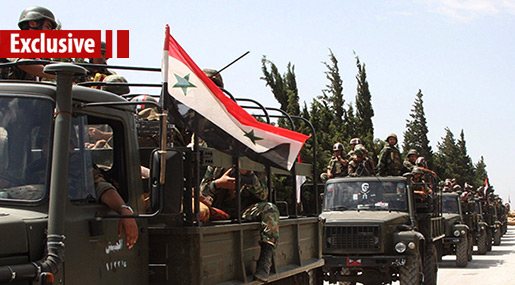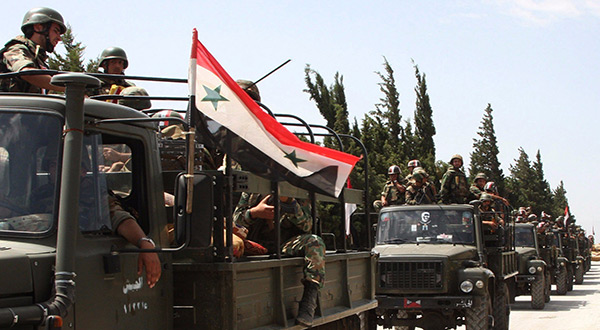
Deir Ez-Zor: The Final Showdown Against Daesh

Darko Lazar
In the early days of the Syrian conflict, when one city after another was falling into the hands of foreign and domestic terrorist groups, few could have foreseen the present-day situation on the ground.

Fewer still believed Syrian President Bashar al Assad when he vowed to liberate "every inch" of Syria. And absolutely no one believed that the Syrian army and its allies would break the years-long Daesh [Arabic acronym for "ISIS" / "ISIL"] siege of Deir ez-Zor, paving the way for a final showdown against the terror group, in what could very well be the conclusive chapter of Syria's bloody war.
The Director of the GNOSOS think-tank, Ammar Waqqaf, described the breaking of the Daesh stranglehold over Deir ez-Zor as a "historic day" for Syria.
"The government of President Bashar al Assad will receive a huge boost in legitimacy because of this victory," he said.
"They [the government] are allying themselves with the right people, they are making good on their promises and now when President Assad says that he will fight to get every single inch of the Syrian territory, people will believe him and people will give him the necessary mandate to continue doing so."
According to Waqqaf, this week's advances by the Syrian military and its allies vindicate the suffering by those Syrians who refused to succumb; those who stuck by their president and their army when "all the omens said that the government in Damascus is going to collapse imminently".
Fortunately for the region and the world, that day never came. Instead, the wind blew in the opposite direction and the soft sands of the Syrian desert unexpectedly broke the architecture of the global order, thanks in no small part to the resilience and fortitude of the Syrian nation.
Designs for the ‘New Middle East' envisaged by globalists and geo-strategists sitting in western capitals hit a brick wall in Syria. They succeeded only in the material destruction of yet another country, employing a dose of cynicism previously unseen in the modern world.
The importance of Deir ez-Zor
The provincial capital of the eastern Syrian province with the same name - Deir ez-Zor - sits on the Euphrates River. The region has served as the main supply corridor for Daesh militants between neighboring Iraq and Syria.
When the terrorists encircled the city - defended by a single garrison - in 2013, it seemed like it was only a matter of time before Deir ez-Zor was completely overrun.
But as the course of the Syrian conflict changed following the intervention of Hezbollah, Iran and later Russia, the Deir ez-Zor garrison managed to hold out and the city's geostrategic value gradually grew.
Forced to abandon their initial objective of overthrowing the Damascus government, western powers and their regional allies began to focus on occupying large swaths of Syrian territory, with Deir ez-Zor firmly in their crosshairs.
US-backed armed groups, including the Kurdish-led Syrian Democratic Forces [SDF], were meant to capture the entire eastern part of Syria, severing the Beirut-Damascus-Baghdad-Tehran chain.
The Syrian army command explained in a statement that reaching Deir ez-Zor marks "a strategic turn in the war against terrorism", and that the city will be used as a "launching pad to expand military operations in the region".
This effectively sets the stage for a definitive defeat of not just Daesh, but also Washington's regional agenda.
"Should the Syrian army be able to develop the offensive into the eastern part of the Euphrates, that would be very significant because then they could link up with Iraqi forces trying to liberate the western part of Iraq," Ammar Waqqaf believes.
A Russian airstrike that killed several top Daesh commanders outside Deir ez-Zor on Friday suggests that this operation is already underway.
The Russian defense ministry announced that 40 Daesh fighters were killed when its jets struck an underground bunker where senior members of the group were meeting to discuss ways to counter Syrian army advances.
Those killed include the so-called emir of Deir ez-Zor, Mohammed al-Shimali, who was charged with smuggling foreign fighters into Syria.
The group's "war minister", Gulmurod Khalimov, who served as the chief of the special forces in his native Tajikistan and participated in several ‘counterterrorism training courses' organized by the US State Department before he joined Daesh in late 2014, was also killed in the Russian attack.
And as the remaining terrorists flood in from western Iraq and Syria's Raqqa, where the US is engaged in the systematic slaughter of the local population, the final demise of the Daesh ‘state' looks certain to take place in Deir ez-Zor.
Perhaps more importantly, Syria's victory over Daesh will also pose new challenges for the US military intervention, which is emerging as the biggest threat to the country's territorial integrity, and which Washington justifies by claiming to be fighting terrorists.
Waqqaf concluded that further successes in Deir ez-Zor "would be a very big game changer in everything that is happening in the eastern part of Syria, [including] the American presence, [and] the Kurdish aspirations for independence".
Source: Al-Ahed News



